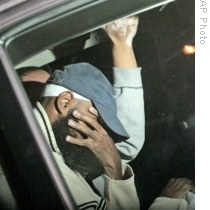London
10 August 2009
The head of Britain's secret intelligence service, MI-6 denies that there has been torture or the complicity to torture by the service in connection with arrests and interrogations of terrorism suspects abroad.
MI-6 chief John Scarlett is adamant - there has been no involvement in torture by the secret service.
 |
| Binyam Mohamed, 30, foreground, a British resident returns after nearly seven years in US captivity (File) |
Speaking on a special British radio program, Scarlett said his officers face a difficult task.
"Our officers are committed to the values and the human rights values of liberal democracy as anybody else," added Scarlett. "They also have the responsibility of protecting the country against terrorism."
There have been numerous allegations that British intelligence officers were involved in the questioning of terror suspects held abroad and that they may have known some of the suspects were being tortured. In one case, British resident Binyam Mohamed claimed he was tortured while in custody in Pakistan and Morocco and he says British officers knew.
Mohamed was transferred to Guantanamo Bay in 2004 and was released back to Britain in February. British police are currently investigating his allegations.
There has been growing pressure for an independent inquiry into possible British knowledge of the use of torture.
The chairman of the parliament's Intelligence and Security Committee, Kim Howells, says the committee has looked into the issue and will continue look at evidence put before it.
"I can tell you that we found no evidence that there has been collusion between the intelligence services, any government department and governments that torture their individuals," said Howells.
But Howells acknowledged the government cannot guarantee that some of the terror suspects picked up and held in other countries did not have their human rights abused.